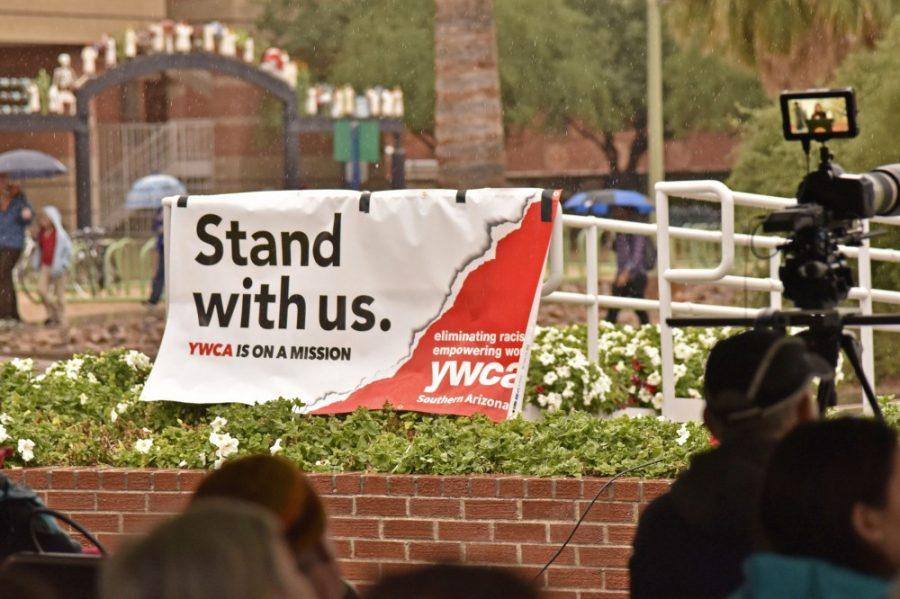As the U.S. prepared to transition to a new presidential administration on Jan. 20, anti-Trump protests were happening throughout the nation and at UA.
At 9 a.m. on Friday, the Teach-In and March for Unity and Solidarity, a peaceful protest conceived by UA professors Monica Casper, Suzanne Dovi, and Liane Hernandez of the YWCA Southern Arizona, began in front of the cactus garden on the UA Mall.
“Non-violent protests are much more effective than violent ones,” Dovi said. “We don’t demonize. It’s more pro-unity than anti-Trump.”
Very popular in the ‘60s and ‘70s, teach-ins were meant to educate and provide college students with expertise about political issues, according to Dovi, a professor in the School of Government and Public Policy.
“Before you engage properly in politics you need to educate yourself,” Dovi said. “We don’t know if this is going to be another normal presidency.”
The teach-in was created to help students identify what kind of skills and knowledge are needed in order to prevent the weakening of democratic practices, explained Dovi.
“All the speakers for the teach-in are dynamic, passionate experts in their subject matter,” she said. “We thought about what students would need to know to prepare for the uncertainties and that’s how we decided what the talks would be about.”

Talks were predominantly made by UA professors and covered a range of different topics. The rights of immigrants, a history of the Ku Klux Klan, hate speech and the Deferred Action for Childhood Arrivals program were only some of the subjects discussed at the teach-in.
Due to the very high chance of rain predicted for Inauguration Day, the march from Old Main to El Presidio Park and the concert scheduled after the teach-in were cancelled.
This did not stop hundreds of diverse, passionate people from coming to gather under tents to hear the teach-in speakers. People from every age, race and political party were welcome to participate in the event.
“Some high schools are even sending their students here,” she said. “We tried to reach out on and off campus.”
Litzeth Flores, a care, health & society freshman, wanted to learn more about the history of hate groups in the U.S.
“I’m hoping to understand a bit more about the context of these issues,” she said. “I’ve always wanted to know the history of the KKK and why such hate groups exist.”
One of the speakers, Tyina Steptoe, an assistant professor in the history department, discussed why hate groups emerge in periods when race or gender are in flux.
“Being president does not always have to mean that you are white or male,” she said. “Recent elections show that most American voters are comfortable with a president who is non-white or female. This frightens white supremacists in the same way that other historic changes frightened people in the past.”
Nina Rabin, a professor of law and director of the Bacon Immigration Law and Policy Program, spoke about immigration issues and the rights of undocumented immigrants in the U.S.
“My daily work involves the individuals impacted by our laws and policies,” she said. “Immigrants have certain legal rights in this country. These rights are due process, the right to be paid for work they performed, the right to attend K-12 public education and the right to protection from unlawful searches and seizures.”

Zaira Livier, president of the Progressive Democrats of Southern Arizona, also discussed the difficulties undocumented immigrants face in Arizona.
“There are 325,000 undocumented immigrants in Arizona,” she said. “Nationally we have 11.2 million. DACA has brought valuable, essential young people out of the shadows. One of Trump’s campaign promises is to end DACA.”
Livier went on to explain the demands from immigrant families and DACA recipients, or DREAMers, to the Tucson community and legislators.
“There will be a march and rally outside the mayor’s office where we are demanding that Tucson take constant action,” she said. “We are demanding that Tucson take a stand and be the first place to define what a sanctuary city is. We will be handing the demand letter to the mayor.”
ASUA Senator, Enrico Trevisani, made a statement reaffirming UA’s support for DACA students.
“DACA approved Arizona residents are assets to our communities,” he said. “They contribute to Arizona’s economy and are valuable to the community’s social and cultural fabrics. ASUA reaffirms its commitment to over 70 DACA students at the UA. We will ensure DACA students have access to the UA and its institutions. We are going to have to play our part and get civically engaged to solve these problems.”
Other UA professors went on to explain the issues of minority groups in Tucson and how to combat them. They also informed the public about how to report hate speech and the importance of being an informed citizen.
According to Flores, the problems our country may face in the next four years are one step closer to being solved thanks to the information offered at the teach-in.
“This event definitely helps make people more aware,” she said. “It makes it so that people won’t have an opinion just to have an opinion.”
Follow Jessica on Twitter.









